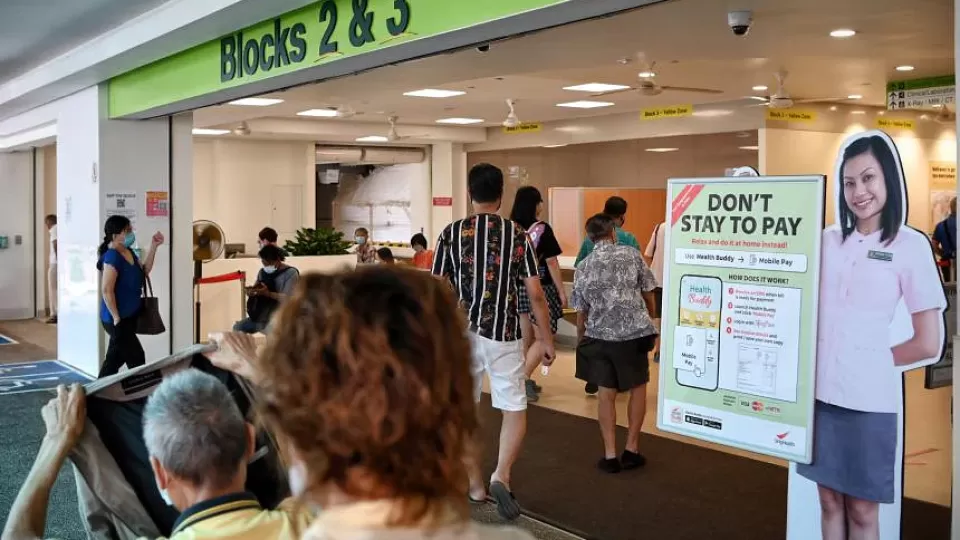November 10, 2022
SINGAPORE – Hospital visits here will continue to be limited to 30 minutes for the next two weeks, and patients will still be allowed only two pre-designated visitors, with one allowed to be at the patient’s bedside at any one time.
These restrictions, as well as similar ones for in-person visits to residential care homes, are being extended until Nov 23 to relieve pressure on hospitals and homes, and protect vulnerable patients and residents from Covid-19, said the Ministry of Health (MOH) on Wednesday.
While the daily number of local Covid-19 cases has fallen over the past few weeks, MOH said both public and private hospitals continue to be under stress from what it said was a significant number of Covid-19 patients who are still hospitalised.
As at Wednesday, 315 Covid-19 patients were in hospital, with 29 requiring oxygen supplementation and 14 in intensive care. The seven-day moving average of local Covid-19 cases was 2,599.
This is down from the peak of 8,243 on Oct 18.
“Homes are also caring for an increased number of Covid-19-positive residents on-site compared with the previous months,” said MOH in a statement.
“MOH will review and calibrate these measures regularly in line with the evolving Covid-19 situation. We seek the understanding and cooperation of patients, residents, and their family members and loved ones,” it added.
The tighter restrictions on in-person visits to hospitals and residential care homes were announced on Oct 14 and they were supposed to end on Nov 10, before MOH announced the extension on Wednesday.
The curbs came amid a surge in local Covid-19 cases at the time, which was attributed to the XBB sub-variant. MOH previously said that the new strain may be driving an increase in reinfections, but there is no evidence that it causes more severe illness.
For the next two weeks, MOH said critically ill patients in hospital will still be allowed up to five pre-designated patients, and two visitors may be allowed at the patient’s bedside at any one point in time.
Visitors may be allowed to stay beyond 30 minutes in exceptional situations, including for patients who are critically ill, paediatric patients, women who are giving birth, and patients who need additional care, such as those with mental incapacity.
The exceptions will continue to be made on a case-by-case basis at the hospitals’ discretion, MOH said.
Visitors are reminded not to eat or drink in the hospital wards, or use the toilets designated for patients in the wards. They should also avoid sitting on patients’ beds, MOH added.
For residential care homes, all residents will continue to be allowed only up to four pre-designated visitors.
Only one person may visit at any one time, with the visit duration limited to 30 minutes.
Visitors should continue to schedule the visits with the care homes ahead of time, said MOH, and they should adhere strictly to prevailing safe management measures within the homes.
Visits may also be suspended if a residential care home is managing active Covid-19 cases.
MOH said visitors to hospitals and homes must ensure that they are well. They are also strongly encouraged to test themselves for Covid-19 using an antigen rapid test kit on the day of their visit.
Visitors must wear masks with good filtration capability at all times during their visits, MOH added. These include surgical masks and reusable masks that are made of two layers of fabric.
Hospitals and homes will have the discretion to impose stricter visitor limits or testing requirements for visitors of vulnerable or unvaccinated patients and residents.
The recent wave of XBB infections worsened a crunch already faced by crowded public hospital emergency departments (EDs), with doctors recounting days when ambulances were unable to discharge patients on arrival due to a lack of space.
On Tuesday, Health Minister Ong Ye Kung told Parliament that hospitals here will no longer set aside entire wards for Covid-19 patients. This is to free up beds that can be used by other patients and help ease the gridlock at EDs.
Mr Ong said the practice is no longer necessary as most of the population are vaccinated against Covid-19 and have good protection against severe illness.
Instead, hospitals will manage Covid-19 patients the same way as they do all other patients – based on the severity of their conditions – while continuing with the practice of using isolation beds for patients assessed to be at risk of spreading infectious diseases.


